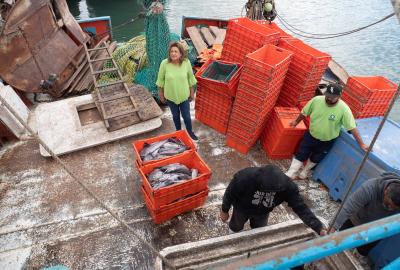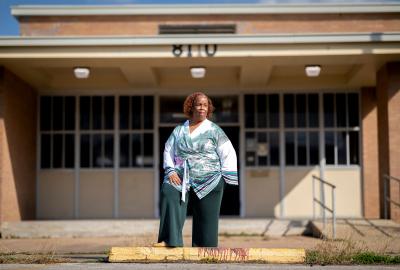Applying for FEMA aid? Follow these tips from disaster relief experts.
Recovery after a hurricane or other natural disaster can be bewildering, and simple missteps — like uploading a JPEG instead of a PDF on a FEMA disaster assistance application — can lead to people missing out on critical financial aid.
“We’ve seen it time and time again in Louisiana,” says Devon Parfait, a coastal resilience analyst at Environmental Defense Fund, who’s also Chief of the Grand Caillou/Dulac Band of the Biloxi-Chitimacha-Choctaw in southern Louisiana. “As a community leader who’s worked on disaster recovery and relief, I know these processes can be confusing.”
Major improvements FEMA made in March 2024 , including a simplified registration process, more housing assistance and flexible funds to cover immediate needs make it easier for underserved communities to receive FEMA assistance.
Chief Devon worked with his tribe's disaster case managers and the disaster relief nonprofit United Cajun Navy to pull together this list of tips they use to help people receive the aid to which they’re entitled.
“My heart goes out to all who have been affected,” he says. “We hope this information is helpful.”
1. Document everything
- Take pictures of damaged property and any items you purchased post-disaster. Document any cost related to recovery.
- Keep all receipts for these purchases and take pictures of them too. Receipts fade! Pictures may be your only viable record.
- Make sure there are date stamps on all photos and documents.
- For FEMA assistance, store everything in PDF format since FEMA cannot read JPEG files. If you need help with this, visit a local library or a mobile FEMA Disaster Recovery Center near you.
2. If you have insurance, you may still qualify for FEMA assistance
- File your insurance claims as soon as possible. Your policy will typically cover immediate relief for basic needs, such as food, water and temporary shelter. FEMA will not duplicate this coverage.
- If your insurance does not cover additional living expenses, such as hotel stays and food, you can appeal to FEMA. Submit a letter and a copy of your insurance declaration page or other forms of proof that you did not receive reimbursement from insurance.
- If your insurance does not fully cover the cost of other expenses, such as home repairs, or purchases of equipment needed for recovery, FEMA may also help with these costs (see below).
3. Be precise in your communications with FEMA
- Answer only the questions asked on your FEMA application. Providing additional information may cause delays in receiving aid.
- For example, when asked how many people are in your household, don't over-explain about your cousin who stayed briefly. Only provide the requested answers and requested proofs (of income, ownership of residence, etc.).
4. $750 is only the start of FEMA assistance
- Most uninsured applicants will likely receive an initial $750 payment from FEMA to meet essential, immediate needs. But this is not the limit of FEMA assistance. You can apply for more relief, as listed below.
5. If your home is severely damaged…
- Get a contractor to give you an official written estimate. They can also help make sure you have the right pictures to document damages and necessary repair work.
- If you don’t have insurance, or if you still need assistance after an insurance payout, you can apply for FEMA aid, up to $42,500.
6. You can be reimbursed for equipment and repairs
- If you need to buy equipment like a de-humidifier after getting flooded, or a chainsaw to remove downed trees, you can request reimbursement. Take pictures documenting the need for and use of the equipment, as well as your receipts.
- If you had to purchase or rent a generator, FEMA will reimburse you if you’ve been without power for 24 hours or more. You can log into your power provider’s account to verify how long your power outage lasted. If you need a generator to power a medical device for even 2-3 hours, that cost will be covered as long as you can prove necessity, for example, with medical records or a doctor’s letter.
- Fuel costs for running generators are not covered.
7. Appeal, appeal, appeal
- You have a right to appeal if your claim is denied. Human error often plays a role in denials. When you appeal, different personnel will review your case.


